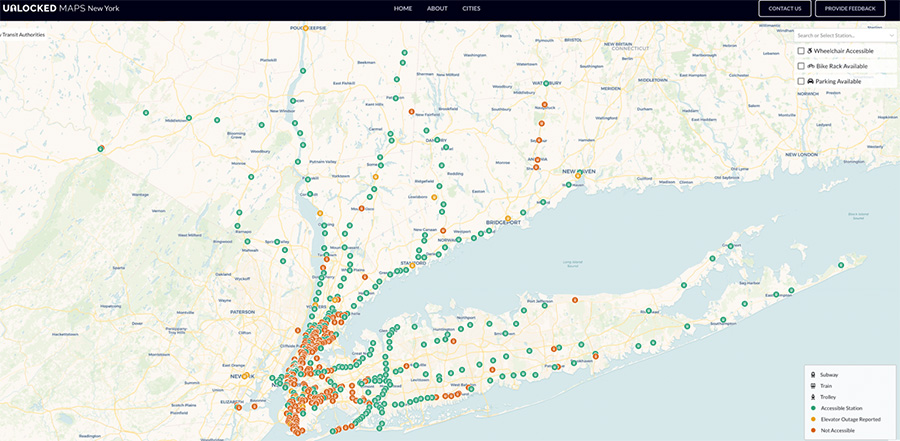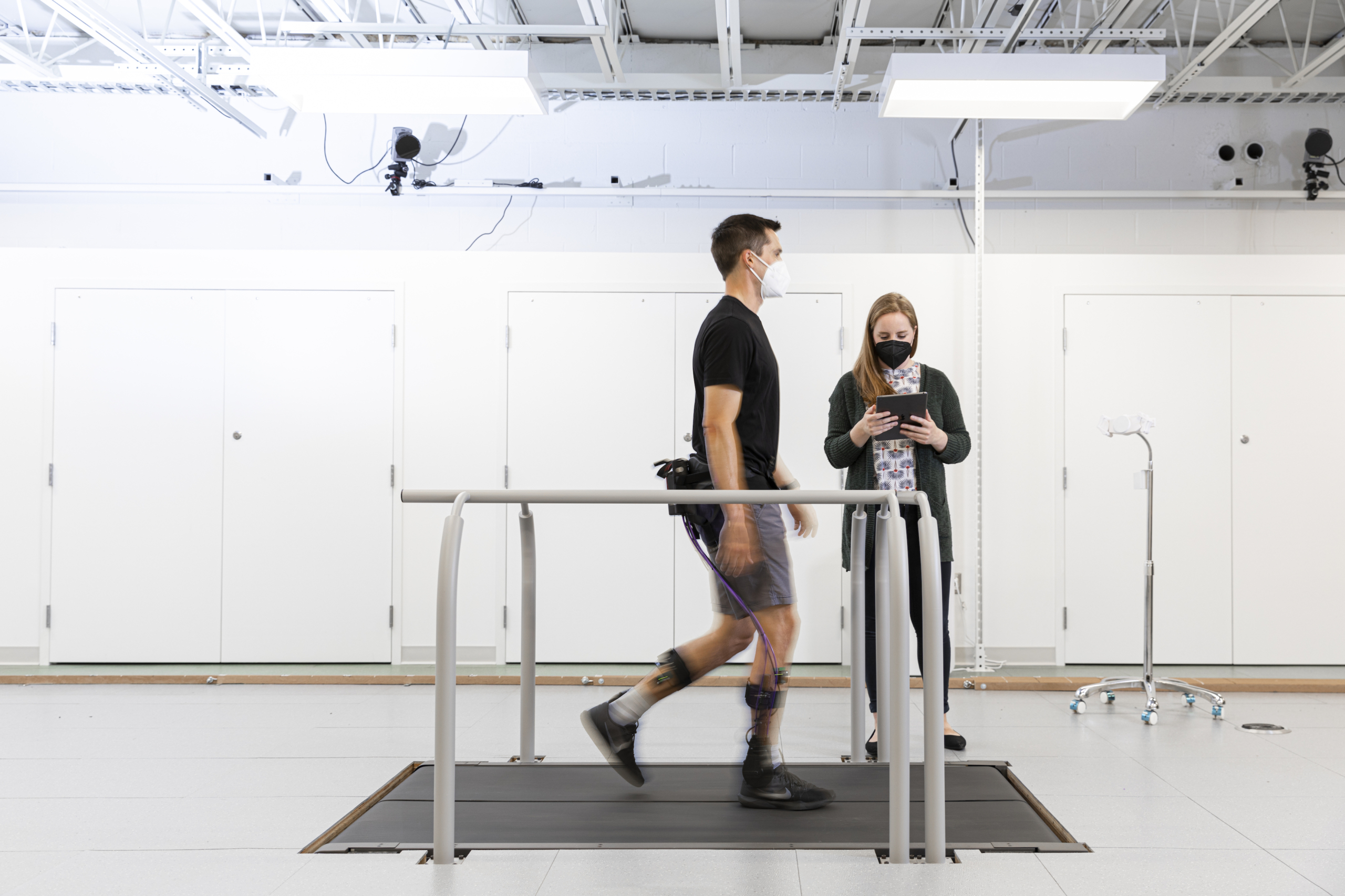September 15, 2025 Exploration and self-initiated mobility are known to support growth in learning, communication, social skills, and play. Yet, due to limited training, funding, or access to different types of devices, powered mobility devices are often underused in early intervention and pediatric therapy settings. Bethany Sloane’s research is focused on addressing these issues, to ensure that children under the age of three have opportunities to explore their environments and participate in daily life through mobility. She aims to create…
Category: mobility
Taskar project helps pedestrians find accessible routes all over Washington state
April 9, 2025 AccessMap was created in the Taskar Center for Accessible Technology (TCAT), which is led by CREATE associate director Anat Caspi. When it was launched in 2017, data was limited to parts of Seattle. Over the years, it has expanded to other cities near the Salish Sea, including Everett, Mount Vernon and Bellingham. “Not only are we including all sidewalks in Washington, which is huge, but we are engaging communities and planners in a massive effort to support data production and…
Feldner team funded to study health outcomes
September 9, 2024 The collaboration, including researchers from the UW Department of Rehabilitation, the UW iSchool, and the University of Pittsburgh, is funded by a 5-year, $3.2 million NIH R01 grant — the first funding of its kind from the NIH to support ableism and health disparity research. “The long-term goal of this work is to reduce disparities and maximize participation, health, and quality of life in partnership with people with mobility disabilities. This work will leverage our team’s multidisciplinary…
Off to the Park: A Geospatial Investigation of Adapted Ride-on Car Usage
November 7, 2023 Adapted ride-on cars (ROC) are an affordable, power mobility training tool for young children with disabilities. But weather and adequate drive space create barriers to families’ adoption of their ROC. CREATE Ph.D. student Mia E. Hoffman is the lead author on a paper that investigates the relationship between the built environment and ROC usage. With her co-advisors Kat Steele and Heather A. Feldner, Jon E. Froehlich (all three CREATE associate directors), and Kyle N. Winfree as co-authors,…
Augmented Reality to Support Accessibility
October 25, 2023 RASSAR – Room Accessibility and Safety Scan in Augmented Reality – is a novel smartphone-based prototype for semi-automatically identifying, categorizing, and localizing indoor accessibility and safety issues. With RASSAR, the user holds out their phone and scans a space. The tool uses LiDAR and camera data, real-time machine learning, and AR to construct a real-time model of the 3D scene, attempts to identify and classify known accessibility and safety issues, and visualizes potential problems overlaid in AR. …
UnlockedMaps provides real-time accessibility info for rail transit users

Congratulations to CREATE Ph.D. student Ather Sharif, Orson (Xuhai) Xu, and team for this great project on transit access! Together they developed UnlockedMaps, a web-based map that allows users to see in real time how accessible rail transit stations are in six metro areas including Seattle, Philadelphia (where the project was first conceived by Sharif and a friend at a hackathon), Chicago, Toronto, New York, and the California Bay Area. Shown here is a screenshot of UnlockedMaps in New York. Stations that are…
A Ph.D. Student’s Promising Research in Mobility in Cerebral Palsy

November 8, 2022 Whether she’s researching how biofeedback systems can guide gait training in children with cerebral palsy or leading toy adaptation events, Alyssa Spomer is committed to advancing accessible technology. A Ph.D. student in UW Mechanical Engineering (ME) and advised by CREATE Associate Director Kat Steele, Spomer is the student chair of CREATE-sponsored HuskyADAPT. Her studies have been multidisciplinary, spanning ME and rehabilitation medicine. She uses her engineering skills to understand the efficacy of using robotic devices to target and improve…
CREATE becomes a principal sponsor of HuskyADAPT
CREATE is pleased to be a financial and advisory sponsor of HuskyADAPT, an interdisciplinary community that is dedicated to improving the availability of accessible technology in Washington and fostering conversations about the importance of accessible design. HuskyADAPT is led by a team of UW students and six faculty advisors, including CREATE directors Kat Steele, Heather Feldner, Anat Caspi and Jennifer Mankoff. Open to all to join, their three primary focus areas are annual design projects, K-12 outreach and toy adaptation workshops, where volunteers learn how to…
Feldner and Steele’s ‘Reimagining Mobility’ series featured in The Daily
November 17, 2021 Collaboration and diverse perspectives and approaches are at the heart of CREATE’s mission to make technology accessible and make the world accessible though technology. One program developed by CREATE faculty looks at mobility solutions and ways to eliminate barriers. Hosted by CREATE associate directors Kat Steele and Heather Feldner, the Reimagining Mobility Conversation Hub brings in speakers from a variety of backgrounds and industries to inspire conversations about the future of mobility. The UW student newspaper, The…
Can Project Sidewalk Use Crowdsourcing to Help Seattleites Get Around?
July 23, 2019 | SeattleMet With the goal of making navigating our streets safer and easier for the mobility impaired, Jon Froehlich’s Project Sidewalk turns mapping sidewalks and improving pedestrian accessibility into a virtual game. To complete missions, users “walk” through city streets via Google Street View, labeling and rating the quality of sidewalks and features that make it easier—or tougher—to get around. They identify curb ramps, or lack thereof, assess their positioning, and point out tripping hazards. Since Froehlich…
Anat Caspi, Associate Director
CREATE Associate Director, Dr. Anat Caspi is interested in exploring ways in which collaborative commons and cooperation can challenge and transform the current economics of assistive technology and incentivize rapid development and deployment of ethically built accessible technologies. Her research focuses on engineering machine intelligent solutions for customizable real-time, responsive technologies in the context of work, play and urban street environments.